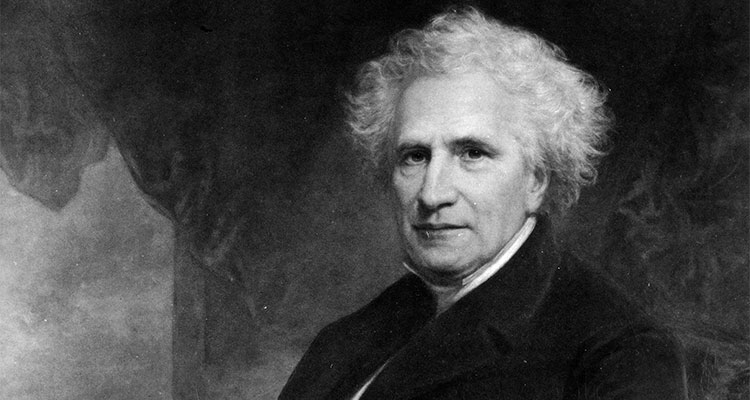
About the Commemoration
William Augustus Muhlenberg, great-grandson of Henry Melchior Muhlenberg, the patriarch of the Lutheran Church in America (see October 7) and son of Frederick Augustus Muhlenberg, the first Speaker of the U.S. House of Representatives, was born in Philadelphia September 16, 1796. He and his sister grew up in an English-speaking home, attended Sunday school at Christ Episcopal Church near their home because of its use of English, and grew to love the service and its music. He graduated from the University of Pennsylvania in 1814 and was ordained an Episcopal priest in 1817. There had been a great deal of movement from the Lutheran Church, when it insisted on the use of German in worship, to the Episcopal Church on the part of those who preferred to use the English language not only in business but in worship also. In New York City the first entirely English Lutheran congregation organized in the United States, Zion (1796), lost its pastor and a considerable number of its members to the Episcopal Church in 1805 and the remainder of their members and their pastor in 1810. The New York Ministerium had even officially declared that the Protestant Episcopal Church was “the English Lutheran Church” to which all Lutherans preferring English to German should be directed.
William Muhlenberg served a parish in Lancaster, Pennsylvania, and there apparently suffered a severe disappointment in love. He never married, and he understood this state to free him for a variety of ministries. He served as head of a boys’ school, in Flushing, Queens, New York, and the use of music (the first boys’ choir in New York), flowers, color, and the emphasis on the church year there had a powerful influence on the boys and many influential churchmen came from the school. Unhappy with the metrical psalter that then served as the hymnal of the Episcopal Church, he wrote hymns, some of which are still sung, and edited hymnals for the church. In 1846 he became rector of the Church of the Holy Communion, founded by his sister, at Twentieth Street and Sixth Avenue in New York City where his social conscience and liturgical emphasis was evident. The pews were free, not rented; there was a parish school, an unemployment fund, visits by poor children to the country. Holy Communion was at the center of the life of the parish, as its name indicated, and in this church in 1852 Anne Ayres founded the Sisterhood of the Holy Communion, patterned after the Deaconess Community in Germany. She and her pastor founded St. Luke’s Hospital in 1857, and Muhlenberg made his home there for the rest of his life. He died April 6, 1877.
His concern for worship and for evangelism, advanced for his time, nonetheless prepared the ground for later liturgical reform and ecumenical activity. He embodied both the Lutheran tradition and the Anglican tradition that would later be joined in the agreement between the Episcopal Church and the Evangelical Lutheran Church in America authorizing intercommunion and the mutual recognition of ministry. William Augustus Muhlenberg was added to the calendar in the American Prayer Book of 1979.
Excerpts from New Book of Festivals & Commemorations: A Proposed Common Calendar of Saints by Philip H. Pfatteicher, copyright, 2008 by Fortress Press, an imprint of Augsburg Fortress.
See also: William Augustus Muhlenberg
Reading
From Theodore L. Cuyler, Recollections of a Long Life
He was one of the most apostolic men I have ever known…. His gray head all men knew in New York. He commanded attention everywhere by his genial face and hearty manner of speech…. When very near the end, the chaplain of the hospital prayed at his bedside for his recovery. “Let us have an understanding about this,” said Muhlenberg. “You are asking God to restore me and I am asking God to take me home. There must not be any contradiction in our prayers, for it is evident that he cannot answer them both.” This was characteristic of his bluff frankness as well as of his heavenly-mindedness—he would not live always.
Quoted in Edward S. Ninde, The Story of the American Hymn (New York and Cincinnati: Abingdon, 1921), 16S. The concluding reference is to Muhlenberg’s hymn “I would not live alway,” included in the Lutheran Church Book as no. 542.
Propers
Do not let your Church close its eyes, O Lord, to the plight of the poor and neglected, the homeless and the destitute, the old and the sick, the lonely and those who have none to care for them. Give us the vision and compassion with which you so richly endowed your servant William Augustus Muhlenberg, that we may labor tirelessly to heal those who are broken in body or spirit, and to turn their sorrow into joy; through Jesus Christ our Lord, who lives and reigns with you and the Holy Spirit, one God, forever and ever.
LFF
Readings: Psalm 84:1-6 or Psalm 133; Ephesians 4:11-16; Matthew 21:12-26
Hymn of the Day: “Thine arm, O Lord, in days of old” (H82 567, LBW 431); “O holy city seen of John” (H82 583, SBH 332); “Saviour, who thy flock art feeding” (SBH 261, H30 343), by W. A. Muhlenberg
Prayers: For the poor, the neglected, the unemployed, the sick and those who suffer; For St. Luke’s hospital in New York City; For a deeper understanding of the Holy Communion as the spring of the Christian life; For those who would improve the quality of hymns in the church; For a broad and tolerant spirit throughout the church.
Preface: A Saint (1) (BCP)
Color: White
